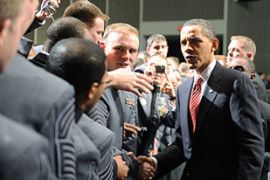Obama sets out Afghan war plan
US president orders 30,000 more troops to Afghanistan as he unveils new war strategy.

The increased deployment will increase the US military presence in Afghanistan to around 100,000.
| Key points of Obama speech |
|
|
The commitment is being seen as a potentially defining moment in the still relatively young Obama presidency and a political gamble that could weigh heavily on his chances for a second White House term.
In his speech he said that after extensive consultations he had determined that the extra deployment was essential to achieving US goals.
“Afghanistan is not lost, but for several years it has moved backwards,” he said, pointing to increasing gains by Taliban fighters and deteriorating security across the country.
“I make this decision because I am convinced that our security is at stake in Afghanistan and Pakistan,” Obama said.
The announcement follows a long-awaited and highly anticipated presidential review of US strategy in Afghanistan, as he spent more than two months consulting military leaders, ambassadors and national security advisers on his options.
White House officials have said the US is also expecting more troop commitments from Nato allies in Europe, with the alliance expected to make a statement on the issue on Friday.
Rapid deployment
Nato diplomats have said the US is asking alliance partners in Europe to add 5,000 to 10,000 troops to the separate international force in Afghanistan.
| In depth |
|
Videos: |
In his speech on Tuesday, Obama said the deployment would take place at the “fastest pace possible”, with the first US marines in place by the end of December.
The objectives he said would be to “target the insurgency and secure key population centres”.
The increase would cost roughly $30bn in the first year alone, he said.
“We must come together to end this war successfully,” Obama said.
“For what’s at stake is not simply a test of Nato’s credibility. What’s at stake is the security of our allies, and the common security of the world.”
Obama began his speech recalling the origins of the war following the September 11, 2001 attacks on New York and Washington, saying the US had not asked for the war in Afghanistan.
“It is from here that we were attacked on 9/11, and it is from here that new attacks are being plotted as I speak,” he said.
“This is no idle danger; no hypothetical threat.”
But, he added, the US had no interest in fighting an endless war in the country.
“It must be clear that Afghans will have to take responsibility for their security,” he said.
Security shortfall
That capacity of Afghan security forces has however been called into question by an Al Jazeera investigation, which found the numbers of police and army personnel to be well below officially stated numbers.
 |
| The increased deployment will take US troops in Afghanistan above the 100,000 mark [AFP] |
Al Jazeera’s David Chater, reporting from Kabul, said that senior military commanders believed the actual number of active personnel in the Afghan army to be as few as 35,000.
That is well below the officially stated figures which are closer to 90,000.
Our correspondent said that puts a major question mark under one of the key elements of Obama’s strategy which is to hand over the bulk of the responsibility for fighting the Taliban to the Afghan army and national police.
“If those two forces turn out to be phantom, it makes it a mirage to believe that US forces can withdraw as early as July 2011,” he said.
Al Jazeera’s James Bays, also reporting from Kabul, noted that Obama’s speech had made little reference to the Taliban, focussing heavily instead on what the US president said was the continued terrorist threat posed by al-Qaeda.
“But it’s not al-Qaeda that America is fighting on the ground here in Afghanistan,” he said.
“Most of the people they are fighting here are Afghans, and they are the Taliban.”
He added that Obama’s speech had also made no mention of talking to the Taliban, a policy advocated by the Afghan president, Hamid Karzai, as he pushes for dialogue and national reconciliation.
In their first reaction to Obama’s announcement, a Taliban spokesman told Al Jazeera the increased deployment announced by the US president would pose little challenge.
“More troops just gives us a larger target to hit,” the spokesman told our correspondent.
Waning support
| Support for the war |
|
Sources: Washington Post, AngusReid Strategies, Tagesspiegel, Lowy Institute |
In the US itself Obama’s speech marks the start of a renewed White House drive to restore waning support for the war effort among an American public grown increasingly pessimistic about success.
It is also aimed at securing backing among some fellow Democrats in Congress who are wary of spending billions more dollars and committing more US soldiers and marines to the war.
Al Jazeera’s senior Washington correspondent, Rob Reynolds, reporting from the West Point academy, said it remained to be seen what effect the speech would have on congress which has the final say in signing off on the billions of dollars in extra funds the expanded deployment will require.
“It’s a question of whether or not Americans are going to buy this central argument that Afghanistan is essential to US national security,” he said.
Even before Obama’s speech, his plan was being treated with scepticism by many in congress, with threats to block funding for the troop increase.
Meanwhile, John McCain, the top Republican senator on the Senate Armed Services Committee and Obama’s rival in last year’s presidential campaign, said that setting a timetable for withdrawal would demonstrate weakness.
“The way that you win wars is to break the enemy’s will, not to announce dates that you are leaving,” he said.
 Successful outcome to war in Afghanistan is “vital” to US national interests.
Successful outcome to war in Afghanistan is “vital” to US national interests.
